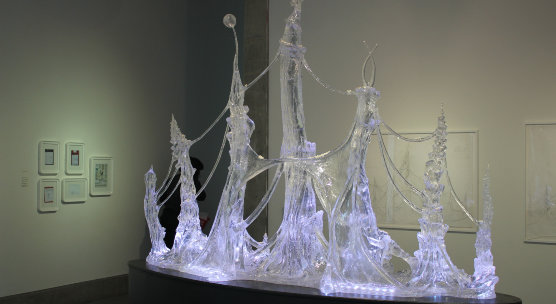Milk-teeth sculptures and donating body parts to art
Published On Thu 28 May 2015 by Grant Hill

A panel discussion on whether consenting adults should be allowed to donate their bodies to art and a fantastical, palace-like structure made with hundreds of milk teeth will bring the ‘Material Concerns’ exhibition at the University of Dundee to a close this weekend.
‘Material Concerns’ at LifeSpace in the Discovery Centre explores the use of human tissue in life, art and scientific research. The exhibition, which has been running since February, includes ‘Palaces’, a sculpture created by artist Gina Czarnecki.
A discussion, asking ‘Should consenting adults be able to donate body parts to art?’ will examine the current ethical picture for working with human tissue in science and art at 3pm on Friday, 29th May at the Sir Kenneth and Lady Noreen Murray Seminar Room.
Gina Czarnecki will form part of the panel that also includes Philip Coates (Tayside Tissue Bank),Professor Alan Fairlamb (Convenor of the University Research Governance & Policy Sub-committee), Morgan Petrie (Portfolio Manager of Creative Scotland) and others.
‘Palaces’ was created by the artist using donations of milk teeth from the public. The sculpture, representing the Tooth Fairy’s palace, will continue to grow over time, like a cluster of stalagmites or coral, as more children donate their milk teeth.
On Saturday 30th May, Gina Czarnecki will be adding teeth to the sculpture and anyone who would like to donate their child’s milk teeth can call in to LifeSpace between 11am–2pm or pop them in the special collection box. Children who donate their teeth will be given a token in return to leave under their pillow and inform the tooth fairy of their donation to her palace. They will also be invited to write or draw a story about their teeth that will be displayed in future exhibitions.
Dr Sarah Cook, Curator of ‘Material Concerns’, said, “This weekend marks the end of our exhibition, which has shined a light on a little understood area of practice - the ethics around the use of donated human tissue in scientific research and in the creation of art.
“We are thrilled that Gina Czarnecki is with us and will be doing a workshop on Saturday to add to her sculpture. Gina describes it as a visual 'tip of the iceberg' in raising awareness of the issues of using human material – such as tissue, blood, sweat, and tears – as material for art, and how myth is bound up in the 'life-giving potential' of 'discarded' body parts.
“The exhibition features objects from the collections of the University of Dundee Museum Services as well as work that has been generously loaned by significant artists including poet Alec Finlay, who has created Scotland's National Memorial to Organ and Tissue donors, and award-winning artist Verena Friedrich who has worked in a research laboratory to create an animation from live skin cells.
“Ms Friedrich’s animation spells out words from products developed by the cosmetics industry that are marketed to rejuvenate skin. This is the last chance to see these works altogether in one place and to learn about the important research into combating disease taking place in Dundee that is made possible through consented tissue donation.
“For those who want to get a more in-depth picture then there is a panel discussion about science, art and ethics taking place on Friday afternoon with a range of researchers and practitioners, meeting for the first time, to better understand one another's practices and debate what is needed to foster art and science collaborations.”
LifeSpace, the research-driven science art gallery, opened to the public in October of last year and is a collaborative partnership between researchers from Duncan of Jordanstone College of Art and Design and the College of Life Sciences. It is open to the public on Saturdays from 11am to 5pm, and is housed within the new Discovery Centre, the latest addition to Dundee’s UK-leading Life Sciences complex.
For media enquiries contact:
Grant Hill
Press Officer
University of Dundee
Nethergate, Dundee, DD1 4HN
TEL: 01382 384768
E-MAIL: g.hill@dundee.ac.uk
MOBILE: 07854 953277